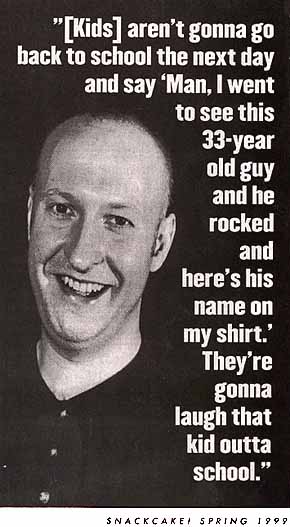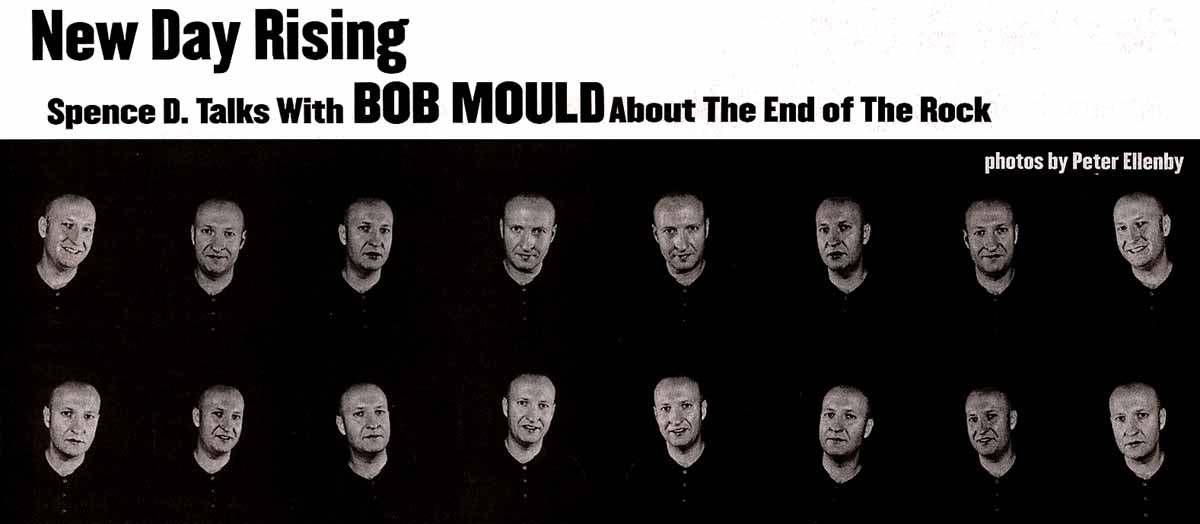familiar with their stuff. People have
drawn - and I think they're accurate, at the risk of
sounding silly - comparisons between what he's done and what I do. I'm
flattered that people find that connection. It's been neat to sit and talk
with him about music and sort of throw ideas around. It's nice. He's got a
pretty huge body of work, you know?"
But then Mould's body of work isn't too shabby, either, including eight
records with Hüsker, four solo records, three Sugar records (one
comprised of b-sides) and somewhere in the range of five EPs. The Last
Dog and Pony Show is a noticeable departure from his previous solo work.
First off, there's quite a bit of keyboard and organ layered throughout,
especially on tracks like "First Drag Of The Day."
"There was a fair amount of Hammond organ on Workbook," remarks Mould.
"I mean, "Compositions For The Young And Old" was pretty much based around
that. With the Hüsker stuff, Grant Hart's side of it, he always wanted
to bring the Hamond organ into pretty much everything. And with Sugar, on
Copper Blue there was a good amount. But I think with the new album,
especially 'Megamanic' and 'First Drag,' I think with the real heavy sampled
stuff it's more apparent and really sits out there." In fact, the
aforementioned "Megamanic" actually has Mould engaging in a rap-like spiel.
"'Megamanic,' that was just a spontaneous thing that I started working on in
the studio, just messing with loops and with a really old, gritty sampler,"
he recalls. "It was fun just to take it over to a couple of the regular songs
and fuck with those a little bit. I experiment with stuff like that at home
a lot but rarely do I put it on records because I got hung up on this thing
where all the records are supposed to be very important and carry this
gravity. With the new record it was time to let my hair down and show people
what I do when I'm having fun."
Anyone who was privileged enough to see Mould's last electric go-around was
obviously aware that the man was indeed having fun. By all accounts his shows
were loose and ragged without being sloppy. Just a guy, his guitar, and
some friends having a blast. Over the years Bob Mould has had the fortune to
work in both a band atmosphere and in the solo spectrum. One can't help but
wonder about the pros and cons of each type of situation.
"Whenever it has a band name it seems to sell more t-shirts. I'm serious.
That's the only difference, really," he laughs. "Kids perceive an actual
name like Bob Mould to be boring. A name like Sugar is exciting. The
content is not that different. It's marketing. And I didn't realize it
until after the fact. It wasn't some master stroke that I came up with while
climbing some mountain. It was just like I noticed it. That's why Sugar was
able to get a broader audience and to have that brief intersection with the
mainstream for a couple of months. We used a lot of primary colors in the
video and we had a band name. People aren't gonna put my name on a t-shirt
and walk around. They're not gonna go back to school the next day and say
'Man, I went to see this 33-year old guy and he rocked and here's his name
on my shirt.' They're gonna laugh that kid outta school. The funny thing is
that I think all the work is equally good. The Workbook/Black
Sheets era, Sugar, and the Dog and Pony stuff is all real
consistent and it's all pretty high quality and it's all my stuff, save a
few Sugar songs which [bassist] David Barbe brought in. And no knock on
Sugar, but the band was put together to make the third Bob Mould solo record.
It just ended up that it was going so well and we were having so much fun
with it that I thought it would be nice to give it a band name because
everybody seemed to be on the [same] wavelength. Anyway, it's really about
perception. Sugar reminded people a lot more of Hüsker Dü, and I
think for people who missed out on Hüsker, it was their chance to re-live
it. It looked a little more familiar. Or maybe 'Bob' was where he was
supposed to be, where people wanted him to be, in a three-piece, over stage
left, screaming fast pop songs. And it was all very comfortable. Which is
great. You know, I don't know these things as they're happening, but when
I look back and the hindsight is a little more accurate than the here and now,
I say 'Okay, I get it.' I'm cool with it. It is what it is. It's just my
interpretation of the recent past, having been there for all of it."
Given the title of his recent album and tour, does Mould actually see the rock
and roll machine as being a dog and pony show? "To me the dog and pony show
is all the promo jazz. Sometimes I get trotted around and I gotta do the meet
and greets. Kissin' hands and shakin' babies and doin' the whole thing,
tellin' everybody to go see my new movie and vote for me for senator. It's
part of projecting a persona and
|
I'm not really that comfortable with it.
I would hope that I can do my work, put it out there and an audience will
come to it at the right time. But the whole dog and pony deal, really
promoting records, doin' the deal - it can be really humiliating. If I have
to go to a radio station in Timbuktu and the on-air talent, who is much more
famous than I'll ever be in that market, puts me on the air for five minutes
at drive time and I'm not even out of the room and he's like, 'Who the fuck
is that asshole?' You know, sure, I feel really good. Take me to the
next market and I'll do it again. When doing something for the station means
they might play your stuff, then my faith in programmers
being able to have independent thought and playing songs because they like
them, it's all gone. That's the part that hurts. When I go on with Jockboy
or whoever and he's making a fool out of me because that's what he does with
everybody that comes to [the station], it's like I'm just a piece of meat.
It's like I'm yesterday's sandwich and I'm supposed to curry some favor with
the station where they might flip me in on next week's call-out. I'm like,
'Okay, so you really don't give a fuck about the record, but I'm here and this
is supposed to get me 10 points in the ring toss?' But then the funny thing
is that I fight these things and I don't want to do them and then every once
in a while it's an amazing scenario where everybody wins. Like 30 people
come, I play a few songs in the studio, I talk to real fans, who had to
justify why they wanted to see the show. The response is amazing, you
couldn't believe how heartfelt and sincere the requests were for tickets.
I love doing stuff like that. But man, when I'm just out there jumping
through the hoop, it's hard and I lose my faith in the business."
Being a legendary musician is hard work, and when you work hard you tend to
et mighty hungry. So what does Bob Mould reach for when those pangs kick in?
Believe it or not, his favorite snack cake item is Little Debbies. "The
ones where it's like soggy oatmeal cookies pressed together with the foam
in the middle," he explains. "I don't eat them any more, but I went through
a phase of really liking them." Mould has since given up the LDs in favor of
Power Bars. "I was into the chocolate ones for awhile, but then it began
to remind me too much of eating Tootsie Rolls so I went over to the oatmeal
raisin. They seem to be more of a staple food item. I'm a Power Bar guy.
You can eat them standing up and you don't have to stop what you're doing."

|

